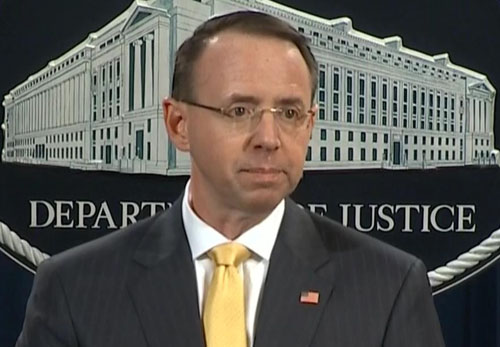by WorldTribune Staff, May 7, 2020
Several months after headline-generating claims in the Democratic Party-financed dossier had lost credibility with investigators, then-Deputy Attorney General Rod Rosenstein authorized special counsel Robert Mueller to target Trump associates Carter Page, Michael Flynn, George Papadopoulos and Paul Manafort, a newly released memo shows.
The Department of Justice on Wednesday released a less-redacted version of the “scoping memo” Rosenstein sent to Mueller on Aug. 2, 2017.

“There was no legitimate reason to believe any of these four were working with the Russians on Aug. 2, 2017. Therefore, the entire Mueller investigation was illegitimate to begin with,” Sen. Lindsey Graham, South Carolina Republican, said on Wednesday.
“At the time, there was no evidence that any of the four conspired with Russia to interfere in the 2016 election — outside of allegations in the dossier compiled by ex-British spy Christopher Steele. No evidence ever materialized and Mueller closed his probe without charging any Trump associate with conspiracy,” Rowan Scarborough noted in a May 7 report for The Washington Times.
After the DOJ released the memo via Graham, who chairs the Senate Judiciary Committee Chairman, the senator tweeted: “The legal foundation for Mueller’s appointment is crumbling.”
Graham pointed out that claims in the “scoping memo” against Page reflected information found in Steele’s dossier and noted that months before the memo was written, a subsource “disavowed” the dossier, and the FBI knew it.
In January 2017, the FBI interviewed Steele’s main Russian source, who repudiated the dossier, saying he was just repeating gossip to the ex-spy.
Iintelligence services had told the FBI in early 2017 that the claims about Page made in the dossier were likely Russian intelligence disinformation.
“The Kremlin learned of Steele’s Democratic Party assignment in July 2016, making him a ready candidate for the Russian statecraft of feeding disinformation to try to destabilize the West. In this case, the target was candidate, and now president, Trump,” Scarborough wrote.
The less-censored memo (compared to a version filed in court in 2018) revealed that Rosenstein targeted Page with this sentence: “Allegations that Carter Page committed a crime or crimes by colluding with Russian government officials with respect to the Russian government’s efforts to interfere with the 2016 election for President of the United States, in violation of United States law.”
The FBI first singled out Page for a counter-intelligence probe in August 2016.
In October 2016, the FBI won a judge’s approval to start electronic and physical surveillance on Page that would last until the following September. Four warrant applications were based on dossier allegations that Page conspired with Russians in Moscow and worked with Manafort as a liaison to the Kremlin. The Department of Justice inspector general said Steele’s claims were essential to obtaining the warrants.
In 2016, then-FBI agent Peter Strzok and other agents were reading Steele’s allegation of a vast conspiracy between the Trump campaign and Russia that never occurred.
Rosenstein also targeted Manafort and Papadopoulos with the allegations they colluded with Russia in the election. This did not prove true either.
Manafort is in federal prison after being convicted of income tax fraud. Papadopoulos pleaded guilty to lying to the FBI about the timing of his meeting with a London-based professor who learned in Moscow that the Russians had dirt on Hillary Clinton.
The allegations against Flynn included that he committed a crime by talking to Russian government officials during the presidential transition.
“This is an apparent reference to the 1799 Logan Act. Strzok interviewed Flynn on Jan. 24, 2017 at the White House with a goal of getting him to admit he violated the act. As a private citizen, so the legal theory goes, he was prohibited from discussing Obama foreign policy with Russian Ambassador Sergey Kislyak,” Scarborough wrote.
Flynn’s backers considered the ploy a joke since no one has ever been convicted of a Logan Act violation and no one prosecuted for more than a century. The DOJ concluded that, as a transition official, Flynn did not violated the law.
Flynn, briefly Trump’s national security adviser, pleaded guilty to lying to the FBI about the phone call with Kislyak. He has since repudiated the plea and is seeking to have his case dismissed on grounds the FBI entrapped and framed him.
The DOJ on Thursday dropped the charges against Flynn after new evidence found by Flynn’s lawyers showed that FBI agents attempted to trap Flynn into lying to them, so that he would be fired or prosecuted.
Intelligence Brief __________ Replace The Media
